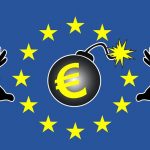What to know now following Italy’s “NO” result and Renzi resignation

Italy’s Prime Minister Matteo Renzi has said he will officially resign Monday, after voters apparently rejected his proposals for constitutional reform. What should investors keep an eye out for after his defeat?
Although the referendum on Sunday was officially on Renzi’s plan for legislative overhaul, it was widely seen in Italy as a vote of confidence in the prime minister and his government. In voting “no” — projections suggest 59% of those in the ballot made that choice — the Italians have set the stage for an early election and perhaps given local populist parties the chance to deliver a Brexit- or Trump-style shake-up.
But if the political uncertainty lasts, the fallout from the vote could have an effect not only within Italy — on its already embattled banks, for instance — but also beyond the borders of the boot-shaped country. Read on for what to know now Renzi is about to step down.
Boost for euroskeptics in Italy
The black eye for Renzi is seen as a victory for the 5 Star Movement, which opposed his political and economic reforms. The party, which has campaigned for Italy to abandon the euro and to reject EU budgetary restrictions, has as much popular support as Renzi’s own Democratic Party, polls show.
The vote may be a signal Italians are ready to put 5 Star in a position of more political power — something that could threaten the eurozone’s current makeup.
“Italian problems could theoretically spark a systemic crisis in the eurozone,” Holger Schmieding, chief economist at Berenberg, said last week.
Euro hits 21-month low
Europe’s common currency dropped slightly as exit polls indicated a lead for “no” in the ballot. The euro EURUSD, -0.2906% fell to a 21-month low of $1.0505 in Asia, before regaining some ground to $1.0564 against the dollar, down about 0.9% from its close on Friday. It fell 1% against the safe-haven EURJPY, +0.37% yen.
“The euro is taking a hit on the back of this news as expected, and we anticipate that this move could continue for some time,” said Naeem Aslam, chief market analyst at ThinkMarket, in emailed remarks late Sunday..
“Although, the selloff is not intense, as there is nothing new or any kind of surprise. The market was expecting this outcome and results have come in line with the expectations,” he said.
Stocks on track to open lower
European stocks were poised to open lower, with futures for the German DAX 30 down 0.8%, those for the French CAC 40 off nearly 10% and FTSE 100 futures down 0.4%. U.S. stock futures revesed earlier losses to trade higher.
How stocks in Europe perform when trading begins Monday will signal the depth of investors’ worry about the eurozone. The lackluster response in the euro may well be echoed by equities, in that the referendum result may already by priced in.
But if Italian shares drop when markets open Monday, investors should snatch them up, J.P. Morgan’s chief European equity strategist Mislav Matejka said ahead of the vote last week.
“There could be a knee-jerk 2-4% market weakness on Monday if there is a ‘no’ outcome. But unlike following the U.S. election and Brexit, this will not be a big surprise, as the polls were consistently in a ‘no’ camp. Investors have already reduced exposure to Italy significantly,” he told MarketWatch.
Italy’s FTSE MIB index I945, +0.24% has dropped by more than 20% this year.
More pressure for Italian banks
Italy’s banks have taken the biggest beating in that slide for stocks, as worries grew that the political upheaval would upset efforts to support the country’s struggling big lenders. The FTSE Italia All-Share Banks Sector Index IT8300, -1.72% has slumped 48% to become one of Europe’s worst-performing indexes.
But like all stocks in Italy, those bank stocks are now priced so low that any further drop would be unwarranted, Matejka said.
“So we think if there is any knee-jerk weakness, it’s great buying opportunity. We would buy into it, because at the end of the day, contagion would be contained by the [European Central Bank],” he said.
Even so, the referendum does put a big question mark over efforts by Banca Monte dei Paschi di Siena SpA BMPS, -0.92% to raise more than $5 billion in capital. If shares in the troubled bank, which fared badly in European stress tests in July, fall heavily on Monday, then that could upset that effort, as well as bruise confidence in other Italian lenders.
Bonds and ‘systemic risk’
The problems in Italy could — in theory — “spark a systemic crisis in the eurozone,” said Holger Schmieding, chief economist at Berenberg, in a recent note.
A “protracted period of political uncertainty after a ‘no’ vote could exacerbate the Italian banking issues, unsettle the Italian bond market and weigh on business and consumer confidence,” he said.
Over recent weeks, the spread between Italian and German 10-year government-bond yields has reached a two-year high, according to Dow Jones Newswires. That has been interpreted by some as a sign that the eurozone is at risk of a breakaway.
Even though markets have been anticipating a “no” vote in Italy, Italian sovereigns bond yields may continue to surge as investors will ask higher return for their risk, Aslam said.
“The ECB, which is going to meet later this week, will have to provide more details about their plan in order to address this issue. [The] Italian banking sector may become the direct causality of this outcome, and during the European session we could see some more selling,” he said.
The ECB and Italian banks
To cope with any immediate market volatility following the referendum, the ECB could temporarily tilt its QE purchases toward more Italian government debt.
The referendum result is likely to crop up in the ECB’s monetary policy discussions when it meets on Thursday, officials and investors told The Wall Street Journal.
The eurozone’s monetary authority will decide on the future of its €1.7 trillion ($1.8 trillion) bond-purchase program, due to expire in March.
A “no” vote potentially heightens the perceived need to keep buying €80 billion a month of bonds, even as some policy makers press Draghi to send a clear signal on how and when the so-called quantitative-easing program will be wound down.
“The ECB might chew on the risk that a ‘no’ vote delays absolutely necessary repair work on Italy’s banks,” said Martin Lück, chief German investment strategist at BlackRock Inc. “It wants to make sure that doesn’t happen.”
To cope with any immediate market volatility following the referendum, the ECB could temporarily tilt its QE purchases toward more Italian government debt. Such action, which could be taken without a formal decision by the bank’s policy makers, would lend support to the Italian bond market going into next year. The central bank has pledged in any case to front-load its bond purchases before the holidays.
Early election?
Whether anti-EU parties become more politically influential may depend on what happens after Renzi’s resignation.
One possibility is for the Italian president, Sergio Mattarella, to ask Renzi to put together a different cabinet and form a new government — but this is seen as unlikely after the referendum defeat.
Alternatively, Matterella could try to put together a “caretaker government,” with a new prime minister, who would work through next year’s budget.
But he could also call early elections, something that opposition parties such as 5 Star and Berlusconi-backed Forza Italia are reportedly pushing for, to happen as soon as possible.
However, mainstream Italian parties are seeking to change existing voting laws before any election. Those laws could help populist parties take more power, by giving them extra seats in Parliament if they win more than 40% of the vote.
Source: MarketWatch




























